 Liane Zane brings her Elioud Legacy trilogy to a rousing and powerful conclusion in this novel, which was actually my favorite of the three. (Full disclosure at the outset: Liane, who’s a Goodreads friend of mine, generously gifted me with a paperback ARC, because she knew I’d really liked the two earlier books. No promise of a good review was offered or requested; this book amply earned that on its merits.)
Liane Zane brings her Elioud Legacy trilogy to a rousing and powerful conclusion in this novel, which was actually my favorite of the three. (Full disclosure at the outset: Liane, who’s a Goodreads friend of mine, generously gifted me with a paperback ARC, because she knew I’d really liked the two earlier books. No promise of a good review was offered or requested; this book amply earned that on its merits.)
This is definitely a series that needs to be read in order. Our story here opens in medias res, and readers who begin here won’t have much knowledge of the premise or the situation –nor, especially, of the characters and their relationships. You really need the context of the first two books to fully appreciate this one. (With that context, though, it becomes a wonderful capstone to the arch the author has crafted!) However, for the benefit of readers who haven’t read either of those books nor my or others’ reviews of them, and who may not have seen the book description either, the titular “Elioud” are human-angel hybrids (matings between the two races having begun before the Flood, and some unions –or rapes of humans by fallen angels– supposedly continuing to occur). Depending on their degree of angelic inheritance, Elioud may have special abilities that most humans do not, and may be quite long-lived (as in, centuries) as well. Those who are aware of what they are may choose, like other humans, to knowingly serve God or Satan (or, also like many humans, to imagine that they can just ignore that whole conflict and be neutrals). But for those on one side or the other, the term “spiritual warfare” may be a lot more literal than it is for most believers.
Near the beginning of the series opener, the three heroines of the trilogy, a close-knit trio of cross-national friends in their early 20s, all of them both working for their respective countries’ intelligence services and involved on the side in a sub rosa vigilante operation of their own against sex traffickers and predators, met three long-lived Elioud warriors, who revealed to the ladies that they also have angel ancestry. Together, the six of them were involved in fighting the nefarious plots, continued across the first two books, of the fallen angel Asmodeus, who’s now set himself up as a cult leader for a sect of brain-washed humans who call themselves bogomili, after a medieval heretical sect (but who are a lot more malevolent and murderous than their earlier, peaceful namesakes). The other aspect of the series plot is that each member of these two trios felt a strong attraction to a member of the other one. It wasn’t hard to predict that each of the three novels would focus on one of these pairs, and that the course of their romance would be an important plot strand. So here, Beta Cerna and Andras Nagy take center stage.
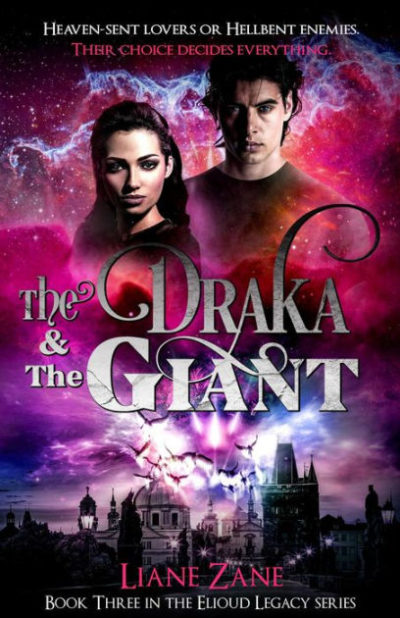 For me, in the previous books, these two characters had always seemed the least interesting and appealing, largely because I didn’t really know them. Indeed, Beta (short for Alzbeta –she’s Czech) is hard to get to know. She’s a “lone wolf” with very few friends, and a brusque manner that can come across as practically feral. And because Andras is big, strong and taciturn, and mostly inclined to obey orders, it’s easy to fall into the trap of subconsciously dismissing him as not very smart or sensitive (though that’s a great mistake!). But here they come into their own; we see them as the complex and special people they truly are. The previous book ended with Beta arousing a sleeping, half groggy Andras for an unexpected sexual encounter in his bed –and then vanishing before morning. When this book opens, none of the other five main characters have seen her for three years (so it’s now 2018). But we soon learn that there’s been more of a reason for her disappearance than her commitment issues. Much is going on, and Asmodeus (and his fellow demon Yeqon. whom we met in the second book) are exponentially ratcheting up their plans, which won’t bode well for humanity if they come to fruition. But the Archangel Michael (directed, of course, by God, though here He operates offstage) has plans too….
For me, in the previous books, these two characters had always seemed the least interesting and appealing, largely because I didn’t really know them. Indeed, Beta (short for Alzbeta –she’s Czech) is hard to get to know. She’s a “lone wolf” with very few friends, and a brusque manner that can come across as practically feral. And because Andras is big, strong and taciturn, and mostly inclined to obey orders, it’s easy to fall into the trap of subconsciously dismissing him as not very smart or sensitive (though that’s a great mistake!). But here they come into their own; we see them as the complex and special people they truly are. The previous book ended with Beta arousing a sleeping, half groggy Andras for an unexpected sexual encounter in his bed –and then vanishing before morning. When this book opens, none of the other five main characters have seen her for three years (so it’s now 2018). But we soon learn that there’s been more of a reason for her disappearance than her commitment issues. Much is going on, and Asmodeus (and his fellow demon Yeqon. whom we met in the second book) are exponentially ratcheting up their plans, which won’t bode well for humanity if they come to fruition. But the Archangel Michael (directed, of course, by God, though here He operates offstage) has plans too….
Many of the strengths of the preceding books are evident here also. Zane realizes the settings well (events take place in several European countries), and flavors the narrative with glimpses of the various customs, languages, folklore and cuisine of the nationalities represented. Her characters are round, vivid, dynamic, and distinct (every one of the six main characters have their own unique personalities, rather than being clones of the others, but the supporting characters are also clearly drawn). There’s a strong good vs. evil conflict (with a recognition that we wage this conflict in our own hearts, not just with other people), with high stakes and a lot of dramatic tension. Though this isn’t commercial “Christian fiction,” it’s fiction written by a Christian (the author is a practicing Roman Catholic) and the basic message is Christian. (As in much supernatural fiction, the angels vs. demons conflict is a metaphor for the spiritual conflicts of the real world.) My one quibble here is that our heroes and heroines don’t pray much in crisis situations (and they’re up to their eyeballs in the latter, which would do wonders for my prayer life!). But that’s a fairly minor point. It was also actually easier for me to achieve “suspension of disbelief” here than in the first two books, despite the continuing murky points of angelology/demonology, and the ramping up of Elioud powers here (the mating of two Elioud warriors enhances their abilities). Perhaps that’s because by now I’ve gotten more used to my Elioud friends and their fictional world. :-)
Bad language here is minimal. There are some references to lewd and disgusting sexual behavior (Asmodeus and Yeqon hang out in Amsterdam’s red-light district, and their sexual attitudes are what you’d expect from demons), and one instance of premarital, though not casual, sex; but Zane doesn’t emphasize the former any more than she has to, and the latter is explicit only up to a point. (Basically, the romantic content is quite wholesome, and a wedding –I’m not saying whose!– is one of the more moving scenes in the book.) This is definitely the most violent book of the series, though, with two major pitched battles and a body count through the roof, not all of the casualties being bad guys. However, fans of action thrillers won’t mind this, and fans who like their heroines tough will love Beta. (She’s a deadly accurate shot with both a pistol and a long gun, but her favorite weapons are her chain whip and her karambit, a hooked originally Indonesian knife modified as a switchblade, which she finds it soothing to flick open and closed when she’s nervous, the way some people tap their foot. :-) )
While this is, like the others in the trilogy, a thick, substantial novel, at 525 pages it doesn’t feel a bit overly long; I was immersed and interested immediately, and stayed so for every page. It’s also a highly evocative read emotionally, with some beautiful writing and imagery in places (and some very grim images as well). I’d enthusiastically recommend it to fans of supernatural fiction with Christian themes, of action thrillers or action heroines (or heroes), and of paranormal romance.
Author: Liane Zane
Publisher: Zephon Books; available through Amazon, both for Kindle and as a printed book.
A version of this review previously appeared on Goodreads.
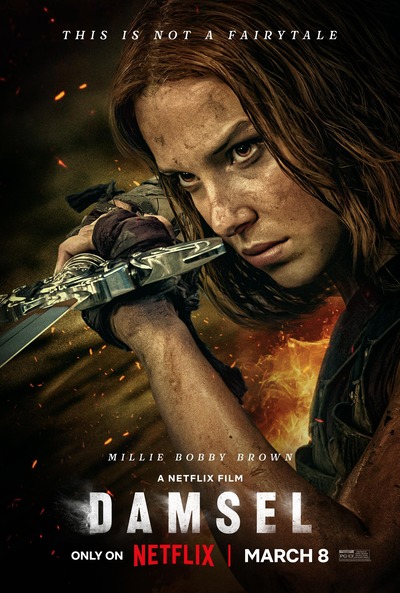 Brown is definitely among Netflix’s golden girls. After breaking out with an ensemble role in Stranger Things, she has taken an action turn, starring in Enola Holmes plus its sequel, and now is in this unconventional fable. If I was feeling snarky, I’d say I liked this better the first time I saw it, when it was called The Princess. That’s a little harsh, though I did feel it was superior. For example, this feels like it takes longer to get going, with Princess Elodie (Brown), daughter of a poor kingdom, married off by her father, Lord Bayford (Winstone), to Prince Henry, the scion of the rich land of Aurea, in a fairy-tale wedding.
Brown is definitely among Netflix’s golden girls. After breaking out with an ensemble role in Stranger Things, she has taken an action turn, starring in Enola Holmes plus its sequel, and now is in this unconventional fable. If I was feeling snarky, I’d say I liked this better the first time I saw it, when it was called The Princess. That’s a little harsh, though I did feel it was superior. For example, this feels like it takes longer to get going, with Princess Elodie (Brown), daughter of a poor kingdom, married off by her father, Lord Bayford (Winstone), to Prince Henry, the scion of the rich land of Aurea, in a fairy-tale wedding. 




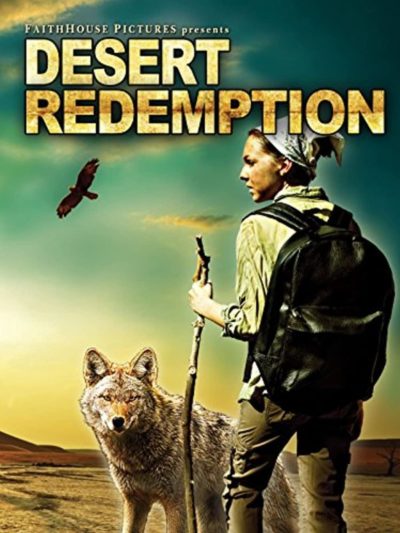 I’ve no problem per se with faith-based cinema. My main issue is that they tend to be, literally, preaching to the converted, and if you’re not already on board, they tend not to work, purely from a cinematic perspective. There are exceptions:
I’ve no problem per se with faith-based cinema. My main issue is that they tend to be, literally, preaching to the converted, and if you’re not already on board, they tend not to work, purely from a cinematic perspective. There are exceptions: 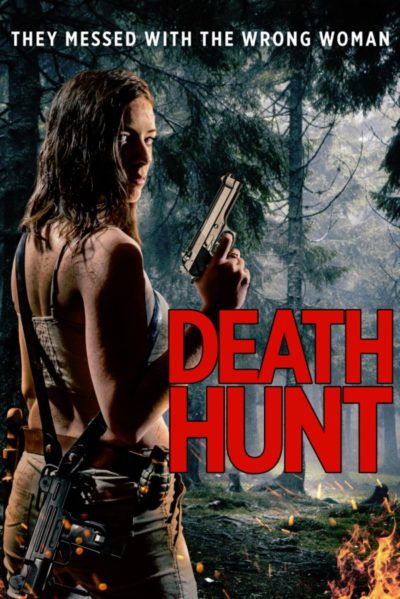 Despite a striking poster (well played, PR team), for the first hour, you’ll probably be wondering why this is included here. Corporate lawyer Ray Harper (Tucci) is on the road, trying to convince reluctant local farmers to sell their land for development. He’s also taking advantage of the away time to hook up with his bit on the side, Brooke Hamilton (Malcolm). Both these enterprises are rudely interrupted when the couple are pulled over by corrupt cop, Williams (Johnston), and abducted at gunpoint. They are the next “guests” on an island run by TJ (McDonald), where he and his pals can get together to hunt… The Most Dangerous Game. Except, they can’t find any of that, so have to make do with a middle-aged executive and his other woman.
Despite a striking poster (well played, PR team), for the first hour, you’ll probably be wondering why this is included here. Corporate lawyer Ray Harper (Tucci) is on the road, trying to convince reluctant local farmers to sell their land for development. He’s also taking advantage of the away time to hook up with his bit on the side, Brooke Hamilton (Malcolm). Both these enterprises are rudely interrupted when the couple are pulled over by corrupt cop, Williams (Johnston), and abducted at gunpoint. They are the next “guests” on an island run by TJ (McDonald), where he and his pals can get together to hunt… The Most Dangerous Game. Except, they can’t find any of that, so have to make do with a middle-aged executive and his other woman.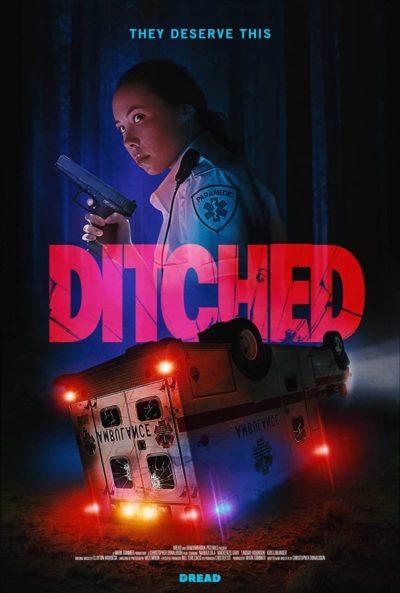 Paramedic Melina (Sila) regains consciousness to find herself in the back of her ambulance, along with her patient, Franson (Loranger), and the rest of the crew in various states of health. The vehicle had gone off the road and fallen into a ravine, along with the accompanying police car. It turns out they were transporting Franson and another prisoner to hospital when the crash took place – and it quickly becomes apparent that what happened was far from an accident. A posse of camo-clad hunters close in on them, led by Caine (Gray). Their mission to make all the vehicle’s occupants, both criminal and otherwise, pay for the sins of their pasts. They’ve brought with them the wronged parties in question, to exact bloody revenge.
Paramedic Melina (Sila) regains consciousness to find herself in the back of her ambulance, along with her patient, Franson (Loranger), and the rest of the crew in various states of health. The vehicle had gone off the road and fallen into a ravine, along with the accompanying police car. It turns out they were transporting Franson and another prisoner to hospital when the crash took place – and it quickly becomes apparent that what happened was far from an accident. A posse of camo-clad hunters close in on them, led by Caine (Gray). Their mission to make all the vehicle’s occupants, both criminal and otherwise, pay for the sins of their pasts. They’ve brought with them the wronged parties in question, to exact bloody revenge.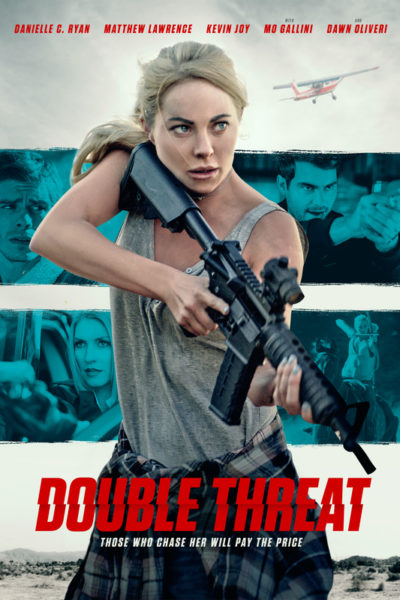 If Ryan looks familiar, that’s because she is. She starred in
If Ryan looks familiar, that’s because she is. She starred in 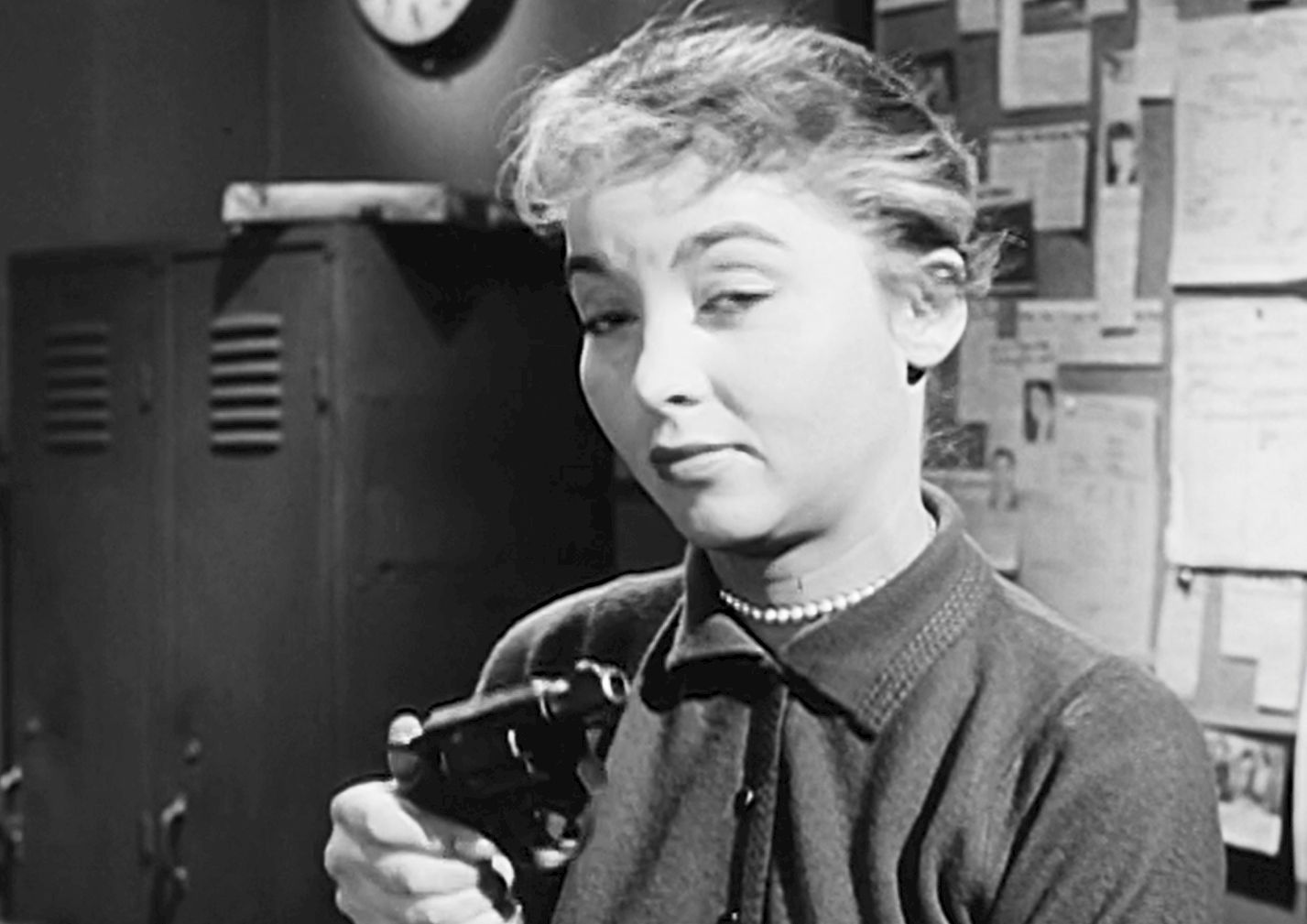
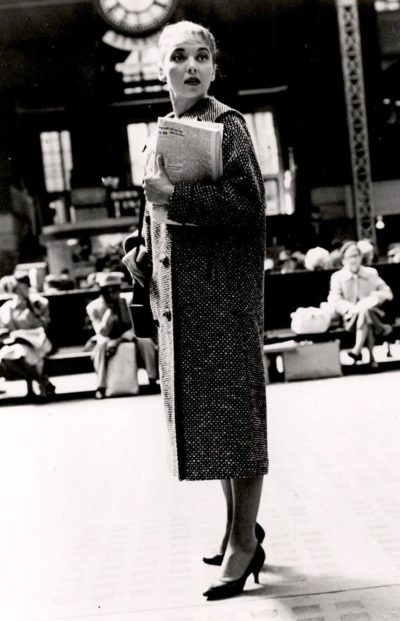 With a lot of voice-overs, the style feels reminiscent of Dragnet, which had been a very popular show for most of the fifties. Each episode opens with a stern reminder: “Presented as a tribute to the Bureau of Policewomen, Police Department, City of New York,” and centre on the cases worked by Patricia “Casey” Jones (Garland). As the title suggests, most of them involve Jones going undercover in some guise. That covers an extremely broad range of assignments, from a photographer to a junkie, a nurse to a blackmailer, a high society girl to a prisoner. However, some of the episodes do not require such subterfuge, though there is a tendency for these crimes she is given for investigation to be fairly gynocentric, e.g. trying to find a delinquent father.
With a lot of voice-overs, the style feels reminiscent of Dragnet, which had been a very popular show for most of the fifties. Each episode opens with a stern reminder: “Presented as a tribute to the Bureau of Policewomen, Police Department, City of New York,” and centre on the cases worked by Patricia “Casey” Jones (Garland). As the title suggests, most of them involve Jones going undercover in some guise. That covers an extremely broad range of assignments, from a photographer to a junkie, a nurse to a blackmailer, a high society girl to a prisoner. However, some of the episodes do not require such subterfuge, though there is a tendency for these crimes she is given for investigation to be fairly gynocentric, e.g. trying to find a delinquent father.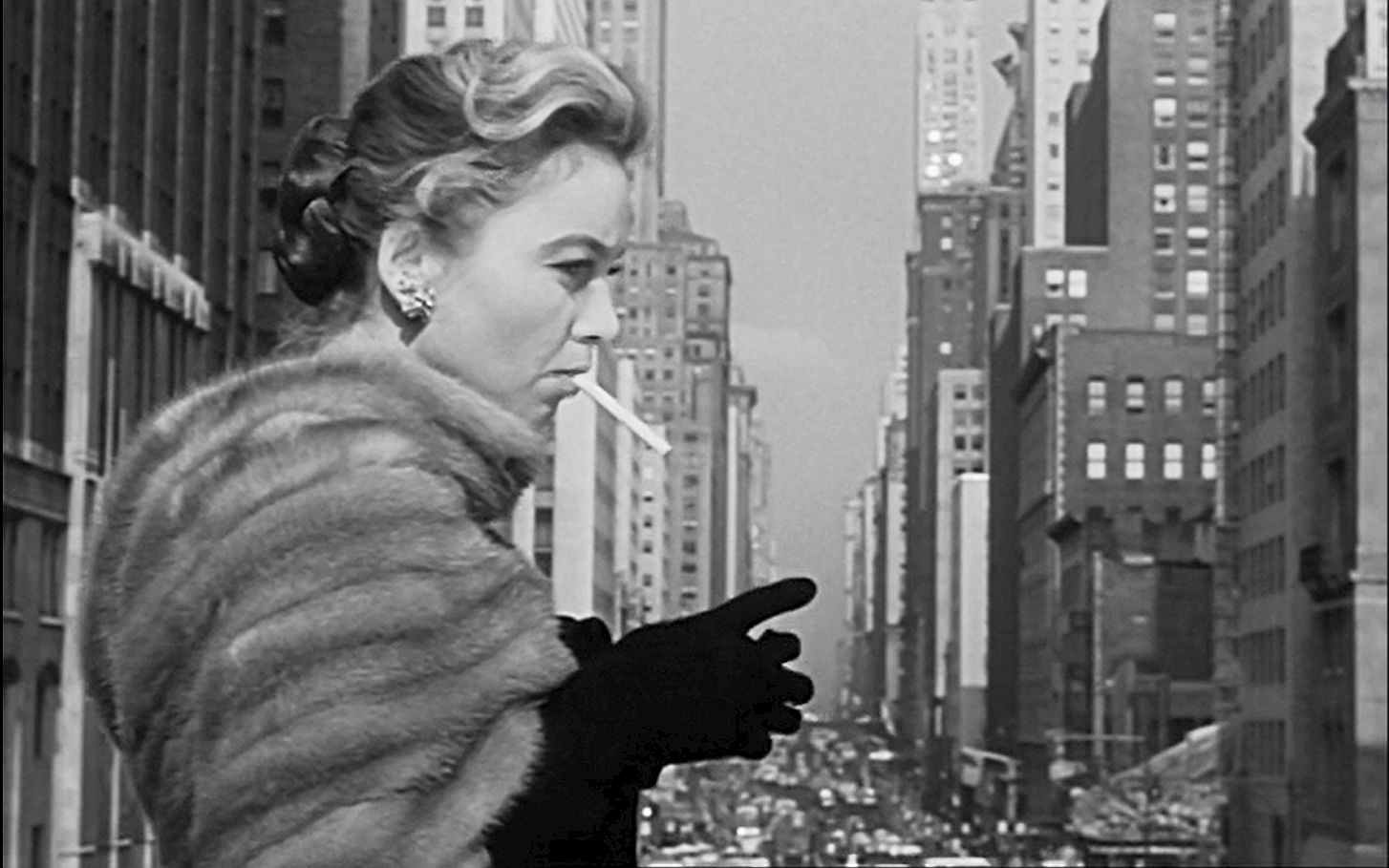
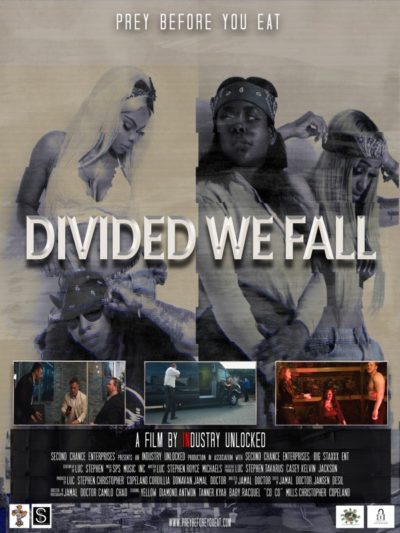 We begin with the usual disclaimer for films of this kind: middle-aged white guys like me are not the target audience. However, I think it’s fair to say that concepts like story-telling and character development are not limited to any particular race, colour or creed, so I still feel equipped to offer an opinion on these aspects. Though, actually, what felt like it worked best here was its strong sense of place. I’ve never been to the projects in Jamaica, New York (though Chris grew up elsewhere in the same borough of Queens). But the film does a good job of showing you that environment; it certainly works better than the (largely token) efforts to convince you some scenes take place in Miami, or even Moscow.
We begin with the usual disclaimer for films of this kind: middle-aged white guys like me are not the target audience. However, I think it’s fair to say that concepts like story-telling and character development are not limited to any particular race, colour or creed, so I still feel equipped to offer an opinion on these aspects. Though, actually, what felt like it worked best here was its strong sense of place. I’ve never been to the projects in Jamaica, New York (though Chris grew up elsewhere in the same borough of Queens). But the film does a good job of showing you that environment; it certainly works better than the (largely token) efforts to convince you some scenes take place in Miami, or even Moscow. Liane Zane brings her Elioud Legacy trilogy to a rousing and powerful conclusion in this novel, which was actually my favorite of the three. (Full disclosure at the outset: Liane, who’s a Goodreads friend of mine, generously gifted me with a paperback ARC, because she knew I’d really liked the two earlier books. No promise of a good review was offered or requested; this book amply earned that on its merits.)
Liane Zane brings her Elioud Legacy trilogy to a rousing and powerful conclusion in this novel, which was actually my favorite of the three. (Full disclosure at the outset: Liane, who’s a Goodreads friend of mine, generously gifted me with a paperback ARC, because she knew I’d really liked the two earlier books. No promise of a good review was offered or requested; this book amply earned that on its merits.) For me, in the previous books, these two characters had always seemed the least interesting and appealing, largely because I didn’t really know them. Indeed, Beta (short for Alzbeta –she’s Czech) is hard to get to know. She’s a “lone wolf” with very few friends, and a brusque manner that can come across as practically feral. And because Andras is big, strong and taciturn, and mostly inclined to obey orders, it’s easy to fall into the trap of subconsciously dismissing him as not very smart or sensitive (though that’s a great mistake!). But here they come into their own; we see them as the complex and special people they truly are. The previous book ended with Beta arousing a sleeping, half groggy Andras for an unexpected sexual encounter in his bed –and then vanishing before morning. When this book opens, none of the other five main characters have seen her for three years (so it’s now 2018). But we soon learn that there’s been more of a reason for her disappearance than her commitment issues. Much is going on, and Asmodeus (and his fellow demon Yeqon. whom we met in the second book) are exponentially ratcheting up their plans, which won’t bode well for humanity if they come to fruition. But the Archangel Michael (directed, of course, by God, though here He operates offstage) has plans too….
For me, in the previous books, these two characters had always seemed the least interesting and appealing, largely because I didn’t really know them. Indeed, Beta (short for Alzbeta –she’s Czech) is hard to get to know. She’s a “lone wolf” with very few friends, and a brusque manner that can come across as practically feral. And because Andras is big, strong and taciturn, and mostly inclined to obey orders, it’s easy to fall into the trap of subconsciously dismissing him as not very smart or sensitive (though that’s a great mistake!). But here they come into their own; we see them as the complex and special people they truly are. The previous book ended with Beta arousing a sleeping, half groggy Andras for an unexpected sexual encounter in his bed –and then vanishing before morning. When this book opens, none of the other five main characters have seen her for three years (so it’s now 2018). But we soon learn that there’s been more of a reason for her disappearance than her commitment issues. Much is going on, and Asmodeus (and his fellow demon Yeqon. whom we met in the second book) are exponentially ratcheting up their plans, which won’t bode well for humanity if they come to fruition. But the Archangel Michael (directed, of course, by God, though here He operates offstage) has plans too…. Roughly ten minutes into this, it was clear I’d made a terrible mistake. I’ve seen my share of wretched creature features in my time, and this is down near the bottom of the barrel. It does have an interesting, if totally ludicrous idea. Five women are invited to a remote hotel, to take part in a game-show, competing for a prize of £100,000. Among them is struggling single mother Sienna (Wunna) who, unable to find a baby-sitter, takes her two kids with her. As the cover ever so subtly suggests, the game has carnivorous dinosaurs roaming the hotel and grounds, and “winning” simply means not getting eaten. Naturally, Sienna’s two kids also disobey Mum’s instructions not to leave the room.
Roughly ten minutes into this, it was clear I’d made a terrible mistake. I’ve seen my share of wretched creature features in my time, and this is down near the bottom of the barrel. It does have an interesting, if totally ludicrous idea. Five women are invited to a remote hotel, to take part in a game-show, competing for a prize of £100,000. Among them is struggling single mother Sienna (Wunna) who, unable to find a baby-sitter, takes her two kids with her. As the cover ever so subtly suggests, the game has carnivorous dinosaurs roaming the hotel and grounds, and “winning” simply means not getting eaten. Naturally, Sienna’s two kids also disobey Mum’s instructions not to leave the room.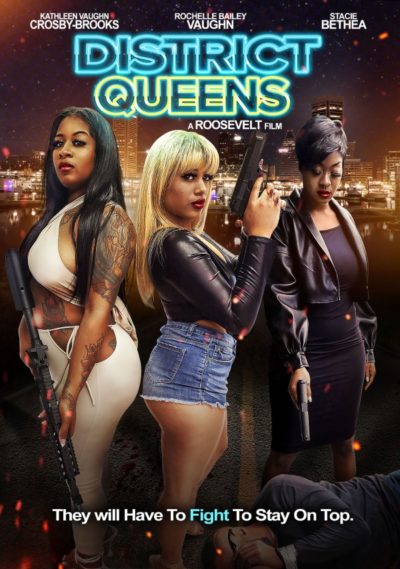 The latest stop in our ongoing tour of female-driven urban crime movies brings us to the nation’s capital in Washington, where the police are celebrating just having taken down a leading light in the city’s organized crime industry. Now, they set their sights on a new target: the gang led by Racine Robinson (Vaughan) and her two daughters, Kat (Crosby) and Candy (Bethea). These might prove a tougher nut to crack, since the Robinson crew have a harsh, zero tolerance policy to anyone who messes with them in the slightest, yet also gathered local support during the coronavirus pandemic. Indeed, Racine is so popular in the neighbourhood, a run for political office is not out of the question. However, she has rivals, who have more than a passing interest in seeing her taken out of the picture – albeit for very different reasons, in order to make room for them to rise up.
The latest stop in our ongoing tour of female-driven urban crime movies brings us to the nation’s capital in Washington, where the police are celebrating just having taken down a leading light in the city’s organized crime industry. Now, they set their sights on a new target: the gang led by Racine Robinson (Vaughan) and her two daughters, Kat (Crosby) and Candy (Bethea). These might prove a tougher nut to crack, since the Robinson crew have a harsh, zero tolerance policy to anyone who messes with them in the slightest, yet also gathered local support during the coronavirus pandemic. Indeed, Racine is so popular in the neighbourhood, a run for political office is not out of the question. However, she has rivals, who have more than a passing interest in seeing her taken out of the picture – albeit for very different reasons, in order to make room for them to rise up.